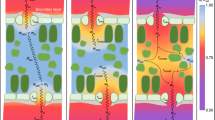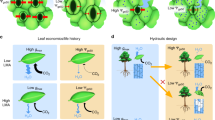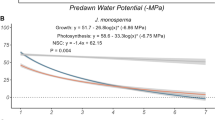Abstract
EXPERIMENTS described by Siegel et al.1 show that cucumber seedlings are capable of surviving a temperature Of −10° C if grown previously for three weeks in an atmosphere of 2 per cent oxygen and 98 per cent argon. This is a most interesting phenomenon, as cucumber normally shows little or no capacity for frost resistance.
This is a preview of subscription content, access via your institution
Access options
Subscribe to this journal
Receive 51 print issues and online access
$199.00 per year
only $3.90 per issue
Buy this article
- Purchase on Springer Link
- Instant access to full article PDF
Prices may be subject to local taxes which are calculated during checkout
Similar content being viewed by others
References
Siegel, S. M., Halpern, L. A., Guimarro, C., Renwick, G., and Davis, G., Nature, 197, 329 (1963).
Levitt, J., Frost Killing and Hardiness of Plants. A Critical Review (Burgess Pub. Co. : Minneapolis, Minn., 1945).
Author information
Authors and Affiliations
Rights and permissions
About this article
Cite this article
SINGLE, W. Effect of Reduced Oxygen Supply on Frost Hardening in Plants. Nature 202, 109–110 (1964). https://doi.org/10.1038/202109a0
Issue Date:
DOI: https://doi.org/10.1038/202109a0
This article is cited by
-
Aspects of the cold-hardiness mechanism in plants
The Botanical Review (1971)
Comments
By submitting a comment you agree to abide by our Terms and Community Guidelines. If you find something abusive or that does not comply with our terms or guidelines please flag it as inappropriate.



